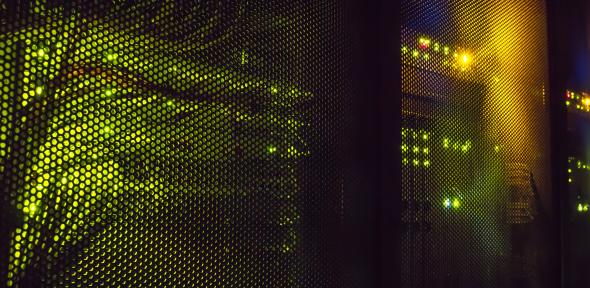
The Cambridge Mathematics Faculty's world-leading research facilities have been further strengthened by the addition of a new, even more powerful, flexible supercomputer. The new supercomputer will be used by mathematicians researching phenomena from galaxy formation to embryonic development, from ocean turbulence to quantum chromodynamics, from image analysis to linguistics, and from the tiniest of sub-atomic particles to the earliest times after the Big Bang.
The machine provides a variety of computing platforms, including the world’s first installation of HPE's new Superdome Flex system, and offers Faculty researchers the ability to test and develop tools using in-house expertise to support 'blue-sky' experimentation.
As machines get more powerful, more data can be analysed, which can have profound effects on entire fields of study. Cosmology, for example, was a field which long existed as speculative theory before high-performance computers enabled it to become a quantitative science.
With exciting new data ... we need flexible and powerful computer systems to keep ahead so we can test our theories and explore new concepts in fundamental physics Stephen Hawking
"Our COSMOS group is working to understand how space and time work, from before the first trillion trillionth of a second after the Big Bang up to today," says Professor Stephen Hawking, the Tsui Wong-Avery Director of Research in Cambridge’s Department of Applied Mathematics and Theoretical Physics. "The recent discovery of gravitational waves offers amazing insights about black holes and the whole Universe. With exciting new data like this, we need flexible and powerful computer systems to keep ahead so we can test our theories and explore new concepts in fundamental physics."
Transforming understanding
Data can also be generated closer to home. Professor Raymond Goldstein, the Schlumberger Professor of Complex Physical Systems, and his research group colleagues produce and analyse enormous numbers of images using light-sheet microscopy to study the dynamics of morphological transformations occurring in early embryonic development. He is enthusiastic about the new machine's effects on his work: "The new system will transform our ability to understand these types of processes and to develop quantitative theories for them. It is also a wonderful opportunity to educate researchers about the exciting overlap between high-performance computing and experimental biophysics."
Dr Stephen Eglen, of the Cambridge Computational Biology Institute, based at the Faculty of Mathematics, uses computational tools to support our understanding of brain growth and repair: "Computational tools are becoming increasingly important in biological sciences," he explains. "Researchers in maths are building models to study biological problems such as the development of neuronal connectivity. These models help us understand how the brain develops normally and how it might recover from injury."
To enable researchers to get the best out of their new equipment, the Faculty’s experts in high-performance computing (HPC) offer support, advice and technical training in writing computer programs to maximise efficiency. "Computational methods are now a core method in many scientific disciplines, yet there is still a paucity of training resources and facilities for researchers to learn how to effectively use modern hardware," says Eglen. "This HPC resource will give researchers hands-on access to a wide range of modern hardware architectures. This will provide an excellent training environment before users migrate their code to larger scale systems available both within Cambridge and beyond."
Powerful resources for an exciting future
Professor Gordon Ogilvie studies the theory of astrophysical fluid dynamics. The combination of supercomputer and support from the Faculty presents an exciting future for his research: "The best prospects for advancing our theoretical understanding of observed phenomena in astrophysics come from combining physical and mathematical insight with powerful computation," he explains. "The Astrophysics group, with its research interests in the fluid dynamics and magnetic fields of discs, stars and planets, will benefit greatly from a new Faculty HPC system that includes technology similar to the new generation of national and international facilities. Equally important is the Faculty's investment in programming experts who can enable mathematical scientists to access these powerful resources efficiently, as well as training younger researchers in HPC skills."
"The influx of new data about the most extreme events in our Universe has led to dramatic progress in cosmology and relativity," says Professor Paul Shellard, Director of the Centre for Theoretical Cosmology and head of the COSMOS group. "In a fast-moving field we have the twofold challenge of analysing larger data sets while matching their increasing precision with our theoretical models. In-memory computing allows us to ingest all of this data and act on it immediately, trying out new ideas, new algorithms. It accelerates time to solution and equips us with a powerful tool to probe the big questions about the origin of our Universe."
